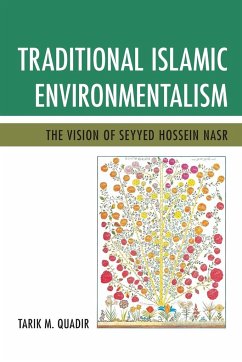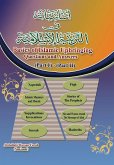- Broschiertes Buch
- Merkliste
- Auf die Merkliste
- Bewerten Bewerten
- Teilen
- Produkt teilen
- Produkterinnerung
- Produkterinnerung
This work examines the relevance of traditional Islamic thought and practices for a lasting solution to the current environmental crisis. The book argues that only a revival of the traditional worldview which perceives all entities of nature as signs of God can effectively respond to the crisis our planet faces.
Andere Kunden interessierten sich auch für
![Charity in Islamic Societies Charity in Islamic Societies]() Amy SingerCharity in Islamic Societies43,99 €
Amy SingerCharity in Islamic Societies43,99 €![The Islamic Conquests In Africa The Islamic Conquests In Africa]() Gew Social Sciences GroupThe Islamic Conquests In Africa47,99 €
Gew Social Sciences GroupThe Islamic Conquests In Africa47,99 €![The Essentials of Islamic Banking, Finance, and Capital Markets The Essentials of Islamic Banking, Finance, and Capital Markets]() John Oluseyi KuforijiThe Essentials of Islamic Banking, Finance, and Capital Markets162,99 €
John Oluseyi KuforijiThe Essentials of Islamic Banking, Finance, and Capital Markets162,99 €![Strategies and Applications of Islamic Entrepreneurship Strategies and Applications of Islamic Entrepreneurship]() Strategies and Applications of Islamic Entrepreneurship204,99 €
Strategies and Applications of Islamic Entrepreneurship204,99 €![Ayatollah Khomeini and The Anatomy of the Islamic Revolution in Iran Ayatollah Khomeini and The Anatomy of the Islamic Revolution in Iran]() Dustin J. ByrdAyatollah Khomeini and The Anatomy of the Islamic Revolution in Iran55,99 €
Dustin J. ByrdAyatollah Khomeini and The Anatomy of the Islamic Revolution in Iran55,99 €![Strategies and Applications of Islamic Entrepreneurship Strategies and Applications of Islamic Entrepreneurship]() Strategies and Applications of Islamic Entrepreneurship267,99 €
Strategies and Applications of Islamic Entrepreneurship267,99 €![Basics of Islamic Upbringing. Basics of Islamic Upbringing.]() Farah (San'aani) Abdullahi HassanBasics of Islamic Upbringing.19,99 €
Farah (San'aani) Abdullahi HassanBasics of Islamic Upbringing.19,99 €-
-
-
This work examines the relevance of traditional Islamic thought and practices for a lasting solution to the current environmental crisis. The book argues that only a revival of the traditional worldview which perceives all entities of nature as signs of God can effectively respond to the crisis our planet faces.
Hinweis: Dieser Artikel kann nur an eine deutsche Lieferadresse ausgeliefert werden.
Hinweis: Dieser Artikel kann nur an eine deutsche Lieferadresse ausgeliefert werden.
Produktdetails
- Produktdetails
- Verlag: Globe Pequot Publishing Group Inc/Bloomsbury
- Seitenzahl: 276
- Erscheinungstermin: 16. September 2013
- Englisch
- Abmessung: 229mm x 152mm x 15mm
- Gewicht: 404g
- ISBN-13: 9780761861430
- ISBN-10: 0761861432
- Artikelnr.: 38128084
- Herstellerkennzeichnung
- Produktsicherheitsverantwortliche/r
- Europaallee 1
- 36244 Bad Hersfeld
- gpsr@libri.de
- Verlag: Globe Pequot Publishing Group Inc/Bloomsbury
- Seitenzahl: 276
- Erscheinungstermin: 16. September 2013
- Englisch
- Abmessung: 229mm x 152mm x 15mm
- Gewicht: 404g
- ISBN-13: 9780761861430
- ISBN-10: 0761861432
- Artikelnr.: 38128084
- Herstellerkennzeichnung
- Produktsicherheitsverantwortliche/r
- Europaallee 1
- 36244 Bad Hersfeld
- gpsr@libri.de
Tarik M. Quadir, PhD, studied at Swarthmore College, George Washington University, Harvard University, and the University of Birmingham, UK. He currently teaches at the Necmettin Erbakan University in Turkey. Quadir's research interests include Sufism, the history of science, Islamic thought, environmentalism, peace-making, and South Asian religions.
Acknowledgements Introduction 0.1 The Environmental Crisis is Caused by
Modern Technology-Based Lifestyles 0.2 Introduction to Seyyed Hossein Nasr
0.3 Failures of Mainstream Environmentalism 0.4 The Role for Religions and
the Significance of Nasr 0.5 Nasr on Technological Solutions 0.6 Nasr and
the Perennial Philosophy 0.7 Nasr and Traditional Islam 0.8
Environmentalism in the Muslim World and Nasr 0.9 The Need for a Sacred
Science 0.10 Introduction Summary Chapter 1 A HISTORICAL OVERVIEW OF THE
PHILOSOPHICAL ROOTS OF THE ENVIRONMENTAL CRISIS 1.1 Nature in the
Pre-Modern Christian Europe 1.2 The Root is in Rationalism 1.3 The
Renaissance Humanism and the Emergence of the Promethean Man 1.4 Scientific
Revolution and the Divorce of Science from Metaphysics 1.5 Scientism and
Scientific Progressivism during the Enlightenment and Beyond 1.6 Nasr's
General Recommendations for all Civilizations 1.7 Chapter Summary Chapter 2
THE PERENNIAL PRINCIPLES AND THE METAPHYSICS OF NATURE WITHIN ISLAM 2.1 The
Perennial Principles and the Islamic Tradition 2.2 Metaphysical Exposition
of Tawhid and Hierarchy of Reality 2.3 Chapter Summary Chapter 3
METAPHYSICS, SUFISM, AND ISLAMIC ETHICS 3.1 Nasr's Strategies for the
Dissemination and Application of the Knowledge of Islamic Environmental
Ethics 3.2 Religious and Metaphysical Doctrines at the Foundation of
Islamic Ethics 3.3 The Metaphysics of the Hierarchy of Reality Provides the
Rationale for Shari'a 3.4 Sufism and the Supremacy of Knowledge by the
Heart 3.5 Sufi Popularization of Nature's Wonder 3.6 Chapter Summary
Chapter 4 THE ADVENT OF SCIENTIFIC PROGRESSIVISM AND THE MARGINALIZATION OF
SUFISM 4.1 Nasr on the Contemporary Muslim Attitude towards Modern Science
and Technology 4.2 The Advent of Scientific Progressivism 4.3 The Salafi
Modernists 4.4 Conservative Salafi Rejection of Secularism 4.5
Revivalist/Revolutionary Salafi Movements 4.6 Transcendence of God and the
Growing Affinity between Wahhabis and Salafis 4.7 Chapter Summary Chapter 5
THE PERENNIAL PRINCIPLES AND THE TRADITIONAL ISLAMIC SCIENCES 5.1
Traditional Islamic Sciences 5.2 Classification of Sciences 5.3 Example of
the Traditional Scientists 5.4 Chapter Summary Chapter 6 NASR'S CRITIQUE OF
MODERN SCIENCE AND SCIENTISM 6.1 Nasr and the Philosophy of Science 6.2
Limitations of Modern Science 6.3 Scientism Denies tawhid and the Hierarchy
of Reality 6.4 Scientism Denies any Ultimate Meaning or Purpose 6.5
Scientism in Action 6.6 Nasr's Arguments against the Theory of Evolution
6.7 Modern Science as a Way of Takthir 6.8 Takthir, the Environmental
Crisis, and the Predicament for Muslims 6.9 Chapter Summary Chapter 7
TECHNOLOGY IS NOT VALUE-NEUTRAL 7.1 Work and Spirituality in Islam 7.2 The
Machine and its Relationship with the Human Being 7.3 Preservation and
Revival of Traditional Modes of Production 7.4 Chapter Summary Chapter 8
TOWARDS AN ISLAMIC SCIENCE 8.1 Why Metaphysics? Why the Metaphysics of
Mulla Sadra? 8.2 An Outline of Sadra's Natural Philosophy 8.3 Implications
of Mulla Sadra's Natural Philosophy 8.4 Technology Based on the New Islamic
Science 8.5 The Debate over Islamic Science 8.6 Reform of Educational
Institutions 8.7 Chapter Summary Chapter 9 CONCLUSION 9.1 Summary of Nasr's
Approach for the Islamic World 9.2 What Have We Achieved? 9.3 Final
Reflections Bibliography Index
Modern Technology-Based Lifestyles 0.2 Introduction to Seyyed Hossein Nasr
0.3 Failures of Mainstream Environmentalism 0.4 The Role for Religions and
the Significance of Nasr 0.5 Nasr on Technological Solutions 0.6 Nasr and
the Perennial Philosophy 0.7 Nasr and Traditional Islam 0.8
Environmentalism in the Muslim World and Nasr 0.9 The Need for a Sacred
Science 0.10 Introduction Summary Chapter 1 A HISTORICAL OVERVIEW OF THE
PHILOSOPHICAL ROOTS OF THE ENVIRONMENTAL CRISIS 1.1 Nature in the
Pre-Modern Christian Europe 1.2 The Root is in Rationalism 1.3 The
Renaissance Humanism and the Emergence of the Promethean Man 1.4 Scientific
Revolution and the Divorce of Science from Metaphysics 1.5 Scientism and
Scientific Progressivism during the Enlightenment and Beyond 1.6 Nasr's
General Recommendations for all Civilizations 1.7 Chapter Summary Chapter 2
THE PERENNIAL PRINCIPLES AND THE METAPHYSICS OF NATURE WITHIN ISLAM 2.1 The
Perennial Principles and the Islamic Tradition 2.2 Metaphysical Exposition
of Tawhid and Hierarchy of Reality 2.3 Chapter Summary Chapter 3
METAPHYSICS, SUFISM, AND ISLAMIC ETHICS 3.1 Nasr's Strategies for the
Dissemination and Application of the Knowledge of Islamic Environmental
Ethics 3.2 Religious and Metaphysical Doctrines at the Foundation of
Islamic Ethics 3.3 The Metaphysics of the Hierarchy of Reality Provides the
Rationale for Shari'a 3.4 Sufism and the Supremacy of Knowledge by the
Heart 3.5 Sufi Popularization of Nature's Wonder 3.6 Chapter Summary
Chapter 4 THE ADVENT OF SCIENTIFIC PROGRESSIVISM AND THE MARGINALIZATION OF
SUFISM 4.1 Nasr on the Contemporary Muslim Attitude towards Modern Science
and Technology 4.2 The Advent of Scientific Progressivism 4.3 The Salafi
Modernists 4.4 Conservative Salafi Rejection of Secularism 4.5
Revivalist/Revolutionary Salafi Movements 4.6 Transcendence of God and the
Growing Affinity between Wahhabis and Salafis 4.7 Chapter Summary Chapter 5
THE PERENNIAL PRINCIPLES AND THE TRADITIONAL ISLAMIC SCIENCES 5.1
Traditional Islamic Sciences 5.2 Classification of Sciences 5.3 Example of
the Traditional Scientists 5.4 Chapter Summary Chapter 6 NASR'S CRITIQUE OF
MODERN SCIENCE AND SCIENTISM 6.1 Nasr and the Philosophy of Science 6.2
Limitations of Modern Science 6.3 Scientism Denies tawhid and the Hierarchy
of Reality 6.4 Scientism Denies any Ultimate Meaning or Purpose 6.5
Scientism in Action 6.6 Nasr's Arguments against the Theory of Evolution
6.7 Modern Science as a Way of Takthir 6.8 Takthir, the Environmental
Crisis, and the Predicament for Muslims 6.9 Chapter Summary Chapter 7
TECHNOLOGY IS NOT VALUE-NEUTRAL 7.1 Work and Spirituality in Islam 7.2 The
Machine and its Relationship with the Human Being 7.3 Preservation and
Revival of Traditional Modes of Production 7.4 Chapter Summary Chapter 8
TOWARDS AN ISLAMIC SCIENCE 8.1 Why Metaphysics? Why the Metaphysics of
Mulla Sadra? 8.2 An Outline of Sadra's Natural Philosophy 8.3 Implications
of Mulla Sadra's Natural Philosophy 8.4 Technology Based on the New Islamic
Science 8.5 The Debate over Islamic Science 8.6 Reform of Educational
Institutions 8.7 Chapter Summary Chapter 9 CONCLUSION 9.1 Summary of Nasr's
Approach for the Islamic World 9.2 What Have We Achieved? 9.3 Final
Reflections Bibliography Index
Acknowledgements Introduction 0.1 The Environmental Crisis is Caused by
Modern Technology-Based Lifestyles 0.2 Introduction to Seyyed Hossein Nasr
0.3 Failures of Mainstream Environmentalism 0.4 The Role for Religions and
the Significance of Nasr 0.5 Nasr on Technological Solutions 0.6 Nasr and
the Perennial Philosophy 0.7 Nasr and Traditional Islam 0.8
Environmentalism in the Muslim World and Nasr 0.9 The Need for a Sacred
Science 0.10 Introduction Summary Chapter 1 A HISTORICAL OVERVIEW OF THE
PHILOSOPHICAL ROOTS OF THE ENVIRONMENTAL CRISIS 1.1 Nature in the
Pre-Modern Christian Europe 1.2 The Root is in Rationalism 1.3 The
Renaissance Humanism and the Emergence of the Promethean Man 1.4 Scientific
Revolution and the Divorce of Science from Metaphysics 1.5 Scientism and
Scientific Progressivism during the Enlightenment and Beyond 1.6 Nasr's
General Recommendations for all Civilizations 1.7 Chapter Summary Chapter 2
THE PERENNIAL PRINCIPLES AND THE METAPHYSICS OF NATURE WITHIN ISLAM 2.1 The
Perennial Principles and the Islamic Tradition 2.2 Metaphysical Exposition
of Tawhid and Hierarchy of Reality 2.3 Chapter Summary Chapter 3
METAPHYSICS, SUFISM, AND ISLAMIC ETHICS 3.1 Nasr's Strategies for the
Dissemination and Application of the Knowledge of Islamic Environmental
Ethics 3.2 Religious and Metaphysical Doctrines at the Foundation of
Islamic Ethics 3.3 The Metaphysics of the Hierarchy of Reality Provides the
Rationale for Shari'a 3.4 Sufism and the Supremacy of Knowledge by the
Heart 3.5 Sufi Popularization of Nature's Wonder 3.6 Chapter Summary
Chapter 4 THE ADVENT OF SCIENTIFIC PROGRESSIVISM AND THE MARGINALIZATION OF
SUFISM 4.1 Nasr on the Contemporary Muslim Attitude towards Modern Science
and Technology 4.2 The Advent of Scientific Progressivism 4.3 The Salafi
Modernists 4.4 Conservative Salafi Rejection of Secularism 4.5
Revivalist/Revolutionary Salafi Movements 4.6 Transcendence of God and the
Growing Affinity between Wahhabis and Salafis 4.7 Chapter Summary Chapter 5
THE PERENNIAL PRINCIPLES AND THE TRADITIONAL ISLAMIC SCIENCES 5.1
Traditional Islamic Sciences 5.2 Classification of Sciences 5.3 Example of
the Traditional Scientists 5.4 Chapter Summary Chapter 6 NASR'S CRITIQUE OF
MODERN SCIENCE AND SCIENTISM 6.1 Nasr and the Philosophy of Science 6.2
Limitations of Modern Science 6.3 Scientism Denies tawhid and the Hierarchy
of Reality 6.4 Scientism Denies any Ultimate Meaning or Purpose 6.5
Scientism in Action 6.6 Nasr's Arguments against the Theory of Evolution
6.7 Modern Science as a Way of Takthir 6.8 Takthir, the Environmental
Crisis, and the Predicament for Muslims 6.9 Chapter Summary Chapter 7
TECHNOLOGY IS NOT VALUE-NEUTRAL 7.1 Work and Spirituality in Islam 7.2 The
Machine and its Relationship with the Human Being 7.3 Preservation and
Revival of Traditional Modes of Production 7.4 Chapter Summary Chapter 8
TOWARDS AN ISLAMIC SCIENCE 8.1 Why Metaphysics? Why the Metaphysics of
Mulla Sadra? 8.2 An Outline of Sadra's Natural Philosophy 8.3 Implications
of Mulla Sadra's Natural Philosophy 8.4 Technology Based on the New Islamic
Science 8.5 The Debate over Islamic Science 8.6 Reform of Educational
Institutions 8.7 Chapter Summary Chapter 9 CONCLUSION 9.1 Summary of Nasr's
Approach for the Islamic World 9.2 What Have We Achieved? 9.3 Final
Reflections Bibliography Index
Modern Technology-Based Lifestyles 0.2 Introduction to Seyyed Hossein Nasr
0.3 Failures of Mainstream Environmentalism 0.4 The Role for Religions and
the Significance of Nasr 0.5 Nasr on Technological Solutions 0.6 Nasr and
the Perennial Philosophy 0.7 Nasr and Traditional Islam 0.8
Environmentalism in the Muslim World and Nasr 0.9 The Need for a Sacred
Science 0.10 Introduction Summary Chapter 1 A HISTORICAL OVERVIEW OF THE
PHILOSOPHICAL ROOTS OF THE ENVIRONMENTAL CRISIS 1.1 Nature in the
Pre-Modern Christian Europe 1.2 The Root is in Rationalism 1.3 The
Renaissance Humanism and the Emergence of the Promethean Man 1.4 Scientific
Revolution and the Divorce of Science from Metaphysics 1.5 Scientism and
Scientific Progressivism during the Enlightenment and Beyond 1.6 Nasr's
General Recommendations for all Civilizations 1.7 Chapter Summary Chapter 2
THE PERENNIAL PRINCIPLES AND THE METAPHYSICS OF NATURE WITHIN ISLAM 2.1 The
Perennial Principles and the Islamic Tradition 2.2 Metaphysical Exposition
of Tawhid and Hierarchy of Reality 2.3 Chapter Summary Chapter 3
METAPHYSICS, SUFISM, AND ISLAMIC ETHICS 3.1 Nasr's Strategies for the
Dissemination and Application of the Knowledge of Islamic Environmental
Ethics 3.2 Religious and Metaphysical Doctrines at the Foundation of
Islamic Ethics 3.3 The Metaphysics of the Hierarchy of Reality Provides the
Rationale for Shari'a 3.4 Sufism and the Supremacy of Knowledge by the
Heart 3.5 Sufi Popularization of Nature's Wonder 3.6 Chapter Summary
Chapter 4 THE ADVENT OF SCIENTIFIC PROGRESSIVISM AND THE MARGINALIZATION OF
SUFISM 4.1 Nasr on the Contemporary Muslim Attitude towards Modern Science
and Technology 4.2 The Advent of Scientific Progressivism 4.3 The Salafi
Modernists 4.4 Conservative Salafi Rejection of Secularism 4.5
Revivalist/Revolutionary Salafi Movements 4.6 Transcendence of God and the
Growing Affinity between Wahhabis and Salafis 4.7 Chapter Summary Chapter 5
THE PERENNIAL PRINCIPLES AND THE TRADITIONAL ISLAMIC SCIENCES 5.1
Traditional Islamic Sciences 5.2 Classification of Sciences 5.3 Example of
the Traditional Scientists 5.4 Chapter Summary Chapter 6 NASR'S CRITIQUE OF
MODERN SCIENCE AND SCIENTISM 6.1 Nasr and the Philosophy of Science 6.2
Limitations of Modern Science 6.3 Scientism Denies tawhid and the Hierarchy
of Reality 6.4 Scientism Denies any Ultimate Meaning or Purpose 6.5
Scientism in Action 6.6 Nasr's Arguments against the Theory of Evolution
6.7 Modern Science as a Way of Takthir 6.8 Takthir, the Environmental
Crisis, and the Predicament for Muslims 6.9 Chapter Summary Chapter 7
TECHNOLOGY IS NOT VALUE-NEUTRAL 7.1 Work and Spirituality in Islam 7.2 The
Machine and its Relationship with the Human Being 7.3 Preservation and
Revival of Traditional Modes of Production 7.4 Chapter Summary Chapter 8
TOWARDS AN ISLAMIC SCIENCE 8.1 Why Metaphysics? Why the Metaphysics of
Mulla Sadra? 8.2 An Outline of Sadra's Natural Philosophy 8.3 Implications
of Mulla Sadra's Natural Philosophy 8.4 Technology Based on the New Islamic
Science 8.5 The Debate over Islamic Science 8.6 Reform of Educational
Institutions 8.7 Chapter Summary Chapter 9 CONCLUSION 9.1 Summary of Nasr's
Approach for the Islamic World 9.2 What Have We Achieved? 9.3 Final
Reflections Bibliography Index








